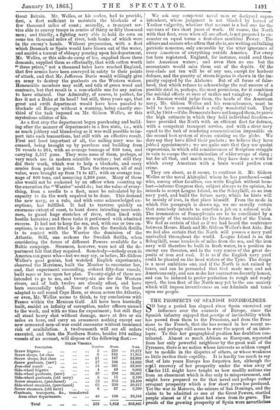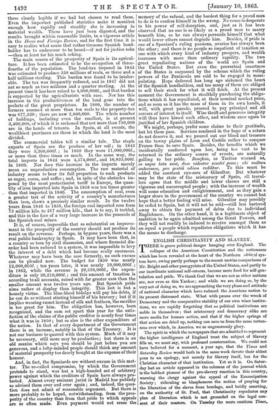THE PROSPECTS OF SPANISH BONDHOLDERS.
SO long a period has elapsed since Spain exercised any influence over the counsels of Europe, since the Spanish infantry enjoyed that prestige of invincibility which has passed from them to the Prussians, and from the Prus- sians to the French, that she has seemed in her recent re- vival, and perhaps still seems to wear the aspect of an inter- loper. To this her geographical position has doubtless con- tributed. Almost as much African- as European, separated from her only powerful neighbour by the great wall of the Pyrenees, there is no nation whose interests so seldom compel her to meddle in the disputes of others, or whose weakness so little invites their cupidity. It is hardly too much to say that of late years Europe has forgotten her, although the rapid recovery of her prosperity under the wise sway of Charles III. might have taught us how readily nations rise from an abasement which is due only to misgovernment, and might have prepared us for that novel and perhaps rather arrogant prosperity which a few short years has produced. Yet the war in Morocco, the seizure of San Domingo, and the claim to be admitted as one of the Great Powers, startled people almost as if a ghost had risen from its grave. The proofs of the growing prosperity of Spain were nevertheless there clearly legible if we had but chosen to read them. Even the imperfect published statistics make it manifest enough how rapidly and steadily she is increasing in material wealth. These have just been digested, and the results brought within reasonable limits, in a vigorous article in the Home and Foreign Review, and for the first time it is easy to realize what cause that rather tiresome Spanish bond- holder has to endeavour to be heard—if not for justice sake —then at least for his much asking.
The main source of the prosperity of Spain is its agricul- ture. It has been estimated to be the occupation of three- fourths of the population. The land-tax imposed in 1845 was estimated to produce 350 millions of reels, or three and a half millions sterling. This burden was found to be intoler- able. The tax was frequently reduced, and in 1847 did not net so much as two millions and a quarter sterling. At the present time it has been raised to 4,000,0001., and that burden is supported by the agriculturists with ease. Nor has this increase in the productiveness of the land gone into the pockets of the great proprietors. In 1800, the number of farmers assessed at more than ten reels to the property-tax was 677,520; there are now 2,800,000. The whole number of holdings, including even the smallest, is at present 3,400,000, of which it is reckoned that not more than 750,000 are in the hands of tenants. In Spain, at all events, the wealthiest provinces are those in which the land is the most divided.
The commercial tables tell a similar tale. The staple exports of Spain are the produce of her soil ; in 1843 they were 3,300,0001.; in 1860 they were 11,000,000/., or more than three times as much. In the same way, the total imports in 1843 were 4,574,0001., and 16,833,000/. in 1860. Nor does this increase in the imports merely mean an unproductive consumption. The raw material of industry seems to bear its full proportion to such products as sugar, cocoa, and coffee ; and, in spite of the obstacles im- posed by the most protectionist tariff in Europe, the quan- tity of iron imported into Spain in 1858 was ten times greater than that imported in 1846. The consumption of coal, even a greater test of the activity of a country's manufactures than iron, shows a precisely similar result. In the twelve years from 1846 to 1858, the foreign coal imported rose from 73 million kils. to 217 million kils., that is to say, it trebled, and this in the face of a very large increase in the proceeds of the Spanish coal mines. It is, of course, impossible that so substantial an improve- ment in the prosperity of the country should not produce its result on the revenue. Perhaps, in bygone years, there was a real public bankruptcy in Spain. It may have been that, in a country so torn by civil dissension, and where financial dis- order had been reduced to a system, it was impossible to levy the interest of a debt which had become really enormous. Whatever may have been the case formerly, no such excuse can be pleaded now. The budget for 1850 was nearly 12,000,000/. ; ten years later, it was nearly 19,000,0001.; in 1862, while the revenue is 20,310,000L, the expen- diture is only 20,210,0001.; and this amount of taxation is according to all accounts, raised with far greater ease than the smaller amount was twelve years ago. But Spanish pride aims rather at display than integrity. This last is but a homely virtue. The blue-blood hidalgo will pay his debts, if he can do so without stinting himself of his bravery; but if it implies wearing russet instead of silk and feathers, the sacrifice is too great for him. The obligation has, however, been recognized, and the sum set apart this year for the satis- faction of the claims of the public creditor is nearly four times what it was in 1850; but so also is the other expenditure of the nation. In that of every department of the Government there is an increase, notably in that of the Treasury. It is not our business to quarrel with this system. Much of it may be necessary, still more may be productive; but there is an old maxim which says you should be just before you are generous, and a lofty-minded people should think any amount of material prosperity too dearly bought at the expense of their honour.
And, in fact, the Spaniards are without excuse in this mat- ter. The so-called compromise, by which the Government pretends to stand, was but a high-handed act of arbitrary power against which the creditors of Spain have always pro- tested. Almost every eminent jurist in Madrid has publicly so advised them over and over again ; and, indeed, the ques- tion does not admit of reasonable argument. But there is more probably to be hoped, notwithstanding, from the pros- perity of the country than from that pride to which appeals are so often made. Even payment would not erase the memory of the refusal, and the hardest thing for a proud man to do is to confess himself in the wrong. No cause is desperate. to his power of self-deception, and, just as it has been observed that no one is so likely as a proud man to marry beneath him, so he can always persuade himself that what would lower others cannot degrade him. Besides, if pride is one of a Spaniard's ruling passions, avarice has always been the other; and there is no people so impatient of taxation as one with which every kind of industry prospers, and wealth increases with more than ordinary rapidity. The two great repudiating nations of the world are Spain and the United States. But even the proverbial smartness of the States is surpassed by the scheme which the ruling powers of the Peninsula are said to be engaged in mani- pulating. Hope deferred has long ago sickened the heart of the Spanish bondholders, and too many of them are obliged to sell their stock for what it will fetch. At the present moment the Government is stealthily purchasing the obliga- tions which it has repudiated, at their nominal market price, and as soon as it has the mass of them in its own hands, it will, with great parade, proceed to pay principal and all arrears of interest to itself. Wise thrift and generous integrity will thus have kissed each other, and wisdom once again be justified of her Spanish children. We might, perhaps, prefer some claims to their gratitude, but let them pass. Services rendered in the hope of a return do not deserve it, and we poured out our blood and treasure on the tawny plains of Leon and Castile rather to conquer France than to save Spain. Besides, the benefits which we incidentally conferred upon her, being too vast to be returned in the ordinary course of events, are naturally galling to her pride. Benefieia, as Tacitus warned us, eo usgue lceta sunt, dum videntur exsolvi posse: ubi mullum antevenere, pro grata odium redditur. To this must be added the constant eye-sore of Gibraltar. But whatever may be the state of the aristocracy of Spain, all travel- lers agree that the middle and lower classes are still a vigorous and uncorrupted people ; with the increase of wealth will come education and enlightenment, and as they gain a larger share in the government of the country we cannot but hope that a better feeling will arise. Gibraltar may possibly be ceded to Spain, but it will not be sold—still less bartered away to obtain the payment of debts due to individual Englishmen. On the other hand, it is a legitimate object of ambition to be again admitted among the Great Powers, and they will not readily be induced to receive amongst them as- an equal a people which repudiates obligations which it has the means to discharge.































 Previous page
Previous page